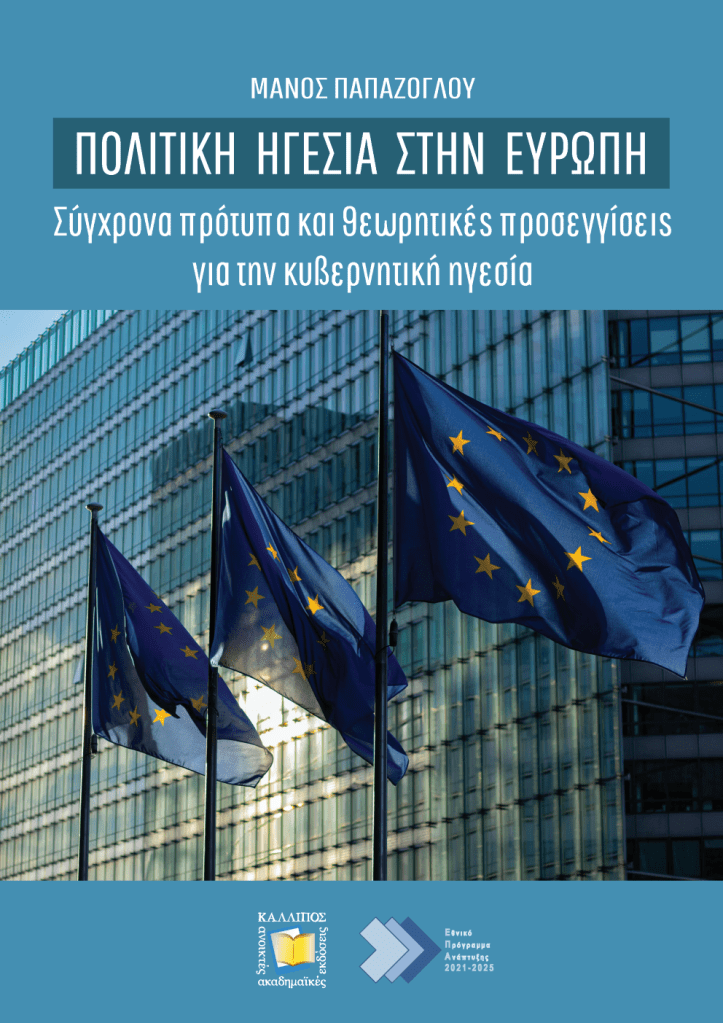
Παπάζογλου, Μ. 2025. Πολιτική ηγεσία στην Ευρώπη. Σύγχρονα πρότυπα και θεωρητικές προσεγγίσεις για την κυβερνητική ηγεσία. Κάλλιπος, Ανοικτές Ακαδημαϊκές Εκδόσεις. https://dx.doi.org/10.57713/kallipos-1063
Βασικό επιχείρημα της μελέτης είναι ότι αποτελεί θεμελιώδη σκοπό των πολιτικών συστημάτων είναι ο μετασχηματισμός των εισροών αιτημάτων σε εκροές κυβερνητικής δράσης, με την οποία διατηρείται η στήριξη και η νομιμοποίηση του συστήματος. Όπως συμβαίνει σε ένα υπολογιστικό σύστημα, η αδυναμία αναβάθμισης του hardware, δηλαδή των θεσμών για τα πολιτικά συστήματα και του διαρκούς συγχρονισμού του λογισμικού, δηλαδή των δημόσιων πολιτικών, μπορεί να υπονομεύσει την αποδοτική λειτουργία και να δοκιμάσει ακόμα και την ισορροπία του συστήματος. Κεντρικό, αλλά όχι αποκλειστικό, ρόλο στις διαδικασίες «αναβάθμισης» και «συγχρονισμού» διαδραματίζει η κυβερνητική ηγεσία, η οποία πραγματοποιεί την ιεράρχηση των αιτημάτων, αξιολογεί τις δυνατότητες, τους κινδύνους και τις απειλές, παρεμβαίνει στις συγκρούσεις συμφερόντων για την κατανομή των πόρων σε μια κοινωνία και για την προσήλωση στο δημόσιο συμφέρον. [..] Η επιλογή των περιπτώσεων της Γαλλίας, της Γερμανίας και της Ελλάδας καθοδηγήθηκε από την ανάγκη ανάδειξης του τρόπου με τον οποίο διαφορετικές κυβερνητικές ηγεσίες χειρίστηκαν το ζήτημα της τήρησης των κανόνων και της εκπλήρωσης των στόχων της οικονομικής διακυβέρνησης. Επίσης, θα διερευνηθεί ο τρόπος με τον οποίο ασκείται αυτή η αμφίδρομη σταθεροποιητική σχέση μεταξύ ευρωπαϊκού και εθνικών πολιτικών συστημάτων. Τέλος, οι τρεις περιπτώσεις είναι, ίσως, οι χαρακτηριστικότερες, για να μελετηθεί η κλίμακα των μεταβολών στα κομματικά συστήματα, των παραγόντων που επιδρούν στην ισορροπία των πολιτικών συστημάτων, αλλά και των προκλήσεων, οι οποίες αναδεικνύονται για τρία αρκετά διαφορετικά μεταξύ τους πολιτικά συστήματα.

Παπάζογλου, Μ. 2012. Σύγχρονη Πολιτική Ηγεσία. Κρίση και Νέα Θεμέλια Διακυβέρνησης. Αθήνα: Παπαζήσης. link
Η μελέτη εξετάζει την ανάδειξη διαφορετικών προτύπων ηγεσίας σύμφωνα με τη μεταβολή του πολιτικού πλαισίου, τις βασικές πολιτειακές παραμέτρους και τις κύριες προκλήσεις στην Ελλάδα της περιόδου 1830-2012. Ιδιαίτερη έμφαση αποδίδεται στους μετασχηματισμούς που πραγματοποιήθηκαν υπό την καταλυτική επίδραση των συνεπειών ειδικότερων συγκυριών κρίσης και της καθοδήγησης των μεταβολών από ηγεσίες με συναφείς δεξιότητες.

Παπάζογλου, Μ. 2009. Οι Προκλήσεις του Εξευρωπαϊσμού και της Διαβούλευσης για το Ελληνικό Πολιτικό Σύστημα. Ευρω-Ρεπουμπλικανισμός και η Δημοκρατική Διαχείριση της Συναίνεσης και της Αμφισβήτησης. Αθήνα: Παπαζήσης. link
Ο εξευρωπαϊσμός των δημοσίων πολιτικών προϋποθέτει στέρεα θεμέλια πολιτικής και διαδικαστικής νομιμοποίησης. Συναίνεση και αμφισβήτηση αποτελούν δύο θεμιτές πρακτικές κατά τη διαδικασία διαβούλευσης. Η ανάλυση αποτελεί συμβολή στη μελέτη της διαβούλευσης, της ιδιότητας του πολίτη και των Ευρωπαϊκών Σπουδών. Τα βασικά επιχειρήματα της ανάλυσης προδιαγράφουν, αν και γράφτηκαν το 2009, τις δυσκολίες που παρουσιάστηκαν κατά τον επιβεβλημένο εξευρωπαϊσμό των πολιτικών για την αναδιοργάνωση του κράτους και της οικονομίας στην περίοδο μετά το 2010.
